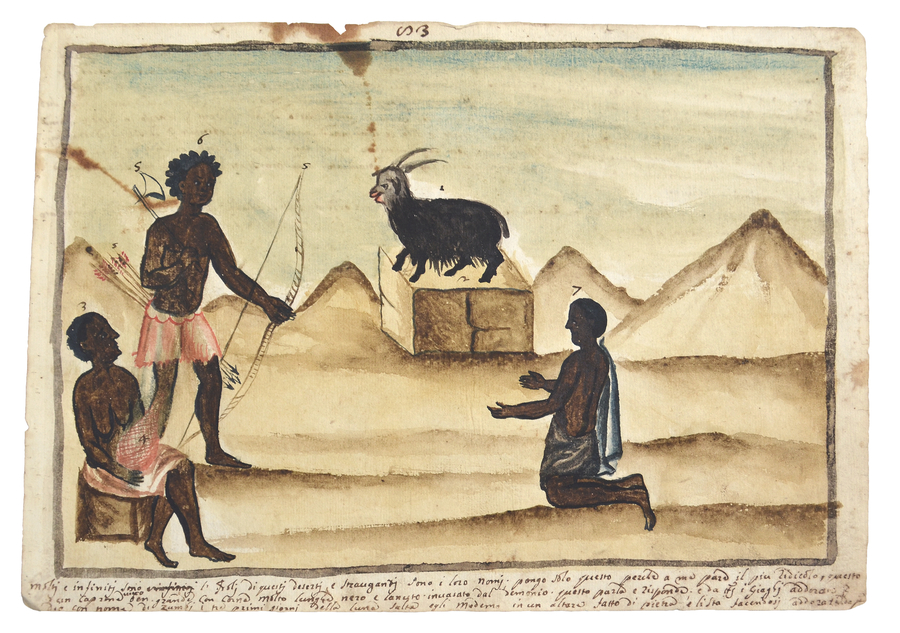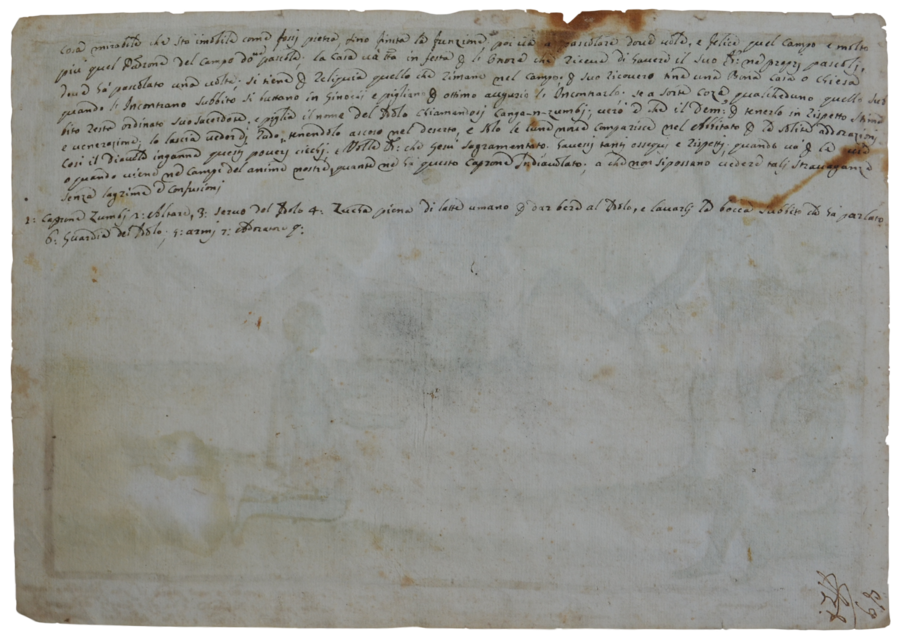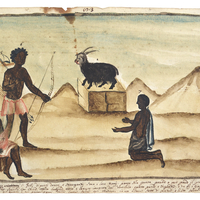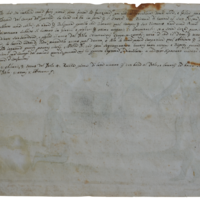PW083: Many and infinite are the Idols of these deserts
Molti e infiniti sono infiniti l’Idoli di questi deserti e stravaganti sono i loro nomi; pongo solo questo perche a me pare il piu ridicolo, questo e un caprine [added: vivo] ben grande, con corne molto lunghe nero e lanuto invasato dal demonio. questo parla e risponde; e da t[u]tti i Giaghi1 adorato p[er] dio con nome di zumbi2; i tre primi giorni della luna salta egli medemo in un altare fatto di pietra e li sta facendosi addorare da t[u]tti
[verso] cosa mirabile che sta imobile come fossi pietra, fino finita la funzione; poi va a pascolare dove vole, e felice quel campo e molto piu quel Padrone del campo dove pascola; la casa và t[u]tta in festa p[er] l’Onore che riceva di havere il suo Id:o ne propri pascoli; dove hà pascolato una volta; si tiene p[er] reliquia quello che rimane nel campo; p[er] suo ricovero tine una Bona casa o chiesa quando l’Incontrano subbito si buttano in ginochi e pigliano p[er] ottimo augurio l’Incontrarlo; se a sorte coza qualcheduno quella subbito resta ordinato suo sacerdote, e piglia il nome del Idolo chiamandosi Canga-n-zumbi3; verò e che il Dem:o p[er] tenerlo in rispetto stima e venerazione; lo lascia veder di rado, tenendolo ascoso nel deserto, e solo le lune nove comparisce nel Abbitato p[er] le solite addorazioni cosi il diavolo inganna questi poveri ciechi; e Volle Id:o che Gesù sagramentato; havessi tanti ossequi e rispetti; quando và p[er] le vie o quando viene ne campi del anime nostre, quante ne ha questo caprone Indiavolato; a che non si possano vedere tali stravaganze senza lagrima e confussioni
1: Caprone Zumbi 2: Altare 3: servo del Idolo 4: Zucha piena di latte umano p[er] dar bere al Idolo, e lavarli la bocca subbito che ha parlato 6: guardia del Idolo; 4: armi 7: Adoratore &:
Many and infinite4 are the Idols of these deserts and extravagant are their names; I include only this one because to me it seems the most ridiculous, it is a live goat, very large with very long horns, black and wooly, possessed by the devil. it talks and answers; and it is adored by all the Jagas as a god with the name of zumbi5 the first three days of the moon it jumps by itself on an altar made of stone and stays there to have itself adored by all
[verso] remarkable thing that it stands immobile as if it were of stone, until the ceremony is over; then it goes grazing where it wants, and happy the field and even more so the Owner of the field where it grazes; the whole house celebrates the honor that it receives to have its god in its own pasture, where it has grazed once; what is left in the field is considered as a relic. for its repose it has a good house or church when they Meet it they drop immediately on their knees and they find it a very good omen to run into it; if by chance he rams into someone this person immediately becomes ordained as its minister, and takes the name of the Idol being called ganga-n-zumbi;6 it is true that the devil to keep it respected esteemed and venerated; only let it be seen rarely, keeping it hidden in the desert, and only in the new moons it appears in Inhabitated areas for the customary adorations. Thus the devil deceives these poor blind people; and may God will that Jesus sacramented; receive as much obsequies and respect; when he goes about the paths or when he comes in the fields of the souls, as does this devilish goat; so that it is not possible to see such extravagances without tears and confusions
1: Zumbi Goat 2: Altar 3: servant of the Idol 4: Gourd full of human milk to give to drink to the Idol and wash its mouth as soon as it has spoken 6: guard of the Idol 5: weapons 7: Worshipper etc.
- 1Giaghi known in the historical sources as Jagas. See Beatrix Heintze and Katja Rieck, “The Extraordinary Journey of the Jaga Through the Centuries: Critical Approaches to Precolonial Angolan Historical Sources,” History in Africa 34 (2007): 67-101; Thornton, A History of West Central Africa to 1850, 14, 74-76.
- 2About Zumbi see Daniel Precioso, Catarina Juliana: Uma sacerdotisa africana e sua sociedade de culto no interior de Angola (Século XVIII) (S.L.: Paco e Littera, 2022); Kalle Kananoja, “Healers, Idolaters, and Good Christians: A Case Study of Creolization and Popular Religion in Mid-Eighteenth Century Angola,” International Journal of African Historical Studies 3 (2010): 443-65.
- 3Canga, from Kikongo and Kimbundu, nganga: priest, ritual practitioner; in this phrase, literally, priest of Zumbi.
- 4“many and infinite,” see Plato’s Timaeus dialogue.
- 5Zumbi see Kananoja, Healing Knowledge in Atlantic Africa, 41-42.
- 6See also the unpaginated vocabulary of words from Matamba in Antonio da Gaeta and Gioia, La maravigliosa conversione.




Add new comment